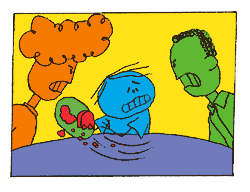Junior Zap is at the dinner table with Mom and Dad. Junior has not finished his dinner, but asks Mom if he can be excused anyway. She says yes. When Junior Zap gets up to leave the table, Dad stops him and says that he must finish the food on his plate. Junior sits down again. Mom and Dad start to argue about whether Junior Zap must finish his meal. Junior gets increasingly upset as they fight over him, and finally spills his plate onto the floor. The parents realize what their fighting is doing and agree that Junior Zap should be excused. Parents and caregivers need to agree, in advance, about aspects of parenting which they expect to encounter - such as whether a child has to finish his meal. Experts suggest that finishing what's on the plate shouldn't be made into an issue. Avoid nagging your child about eating, or getting angry. Parents should not argue in front of their child - expect the child to be upset if it does happen. Parents need to make a decision on how to deal with the immediate situation, then have their discussion in private.  Especially if parents' arguments are frequent, children can become distressed and insecure. They want to be loyal to both parents. The child may feel responsible for the arguments. He may also turn his own emotional upset into hostility and bad behaviour. Especially if parents' arguments are frequent, children can become distressed and insecure. They want to be loyal to both parents. The child may feel responsible for the arguments. He may also turn his own emotional upset into hostility and bad behaviour.
If an argument does happen in front of your child, or close enough for her to hear, you should end it and make up as soon as you can, so that the child can see that the argument is over, and can learn how to resolve conflict from your example. After arguing, don't deny that you had a fight. Reassure your child that you still love each other. If there is any physical violence when you argue, or if the arguments are getting worse and worse, get some outside help. That's also a wise idea if your child is showing increasing distress or bad behaviour. Food for Thought: - What are effective ways to deal with arguments when they come up?
- What are the things you and your partner have trouble agreeing about? What can you do about them?
- What if you and your partner simply can't agree?
- How do you handle mealtime with your child?
| 